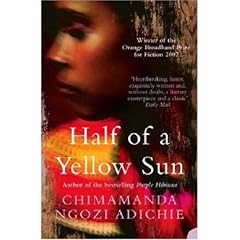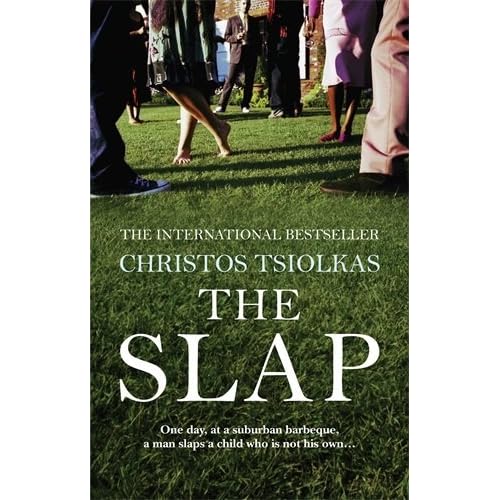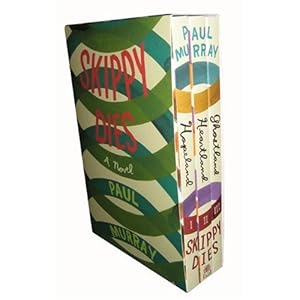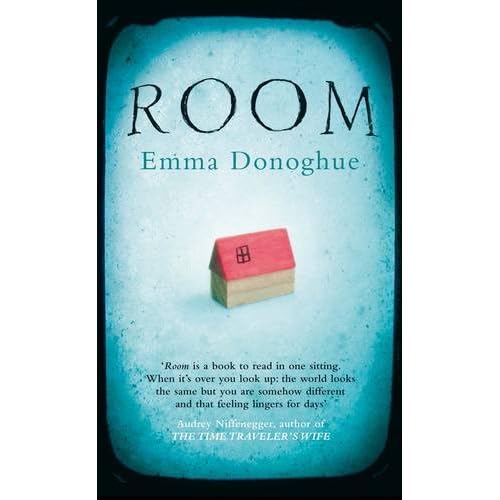 War destroys all that is left of innocence. It pulls people together, and it drives them apart. People are left asking questions, as they pine for their loved ones, as they try and contemplate the horrors of war, and as they struggle to survive - just so that they can see a better day.
War destroys all that is left of innocence. It pulls people together, and it drives them apart. People are left asking questions, as they pine for their loved ones, as they try and contemplate the horrors of war, and as they struggle to survive - just so that they can see a better day.
And it is this aspect of war that Adichie focuses on in her much-acclaimed novel, Half of a Yellow Sun. The story, based in the 1960s, revolves around the Nigeria-Biafra war - a historical event that has escaped the chapters of most history texts outside Africa - and the massacre, starvation, illness, and fear it brought in its wake, as the Igbo people battled for their independence, which was short-lived. Biafra (even my spell-check doesn't recognize it!), in 1970, returned to Nigeria, and as the book stated: a million people died, in the process.
The story's main protagonists are the twins: Olanna and Kainene, who are poles apart, both in looks and in attitude; their lovers: the 'revolutioary professor' Odenigbo, and the awkward introverted Richard - an expatriate writer, enchanted by Igbo history. And then of course, there's Ugwu, a poor village boy who has come to serve the professor, as a house-boy.
The twins, at the outset, are estranged and distant, for no reason whatsoever. Olanna is about to move in with Odenigbo, and teach in Nsukka, whereas Kainene is looking to take her father's business to greater heights. However, as things turn out, due to love and betrayal, the twins' rift grows deeper, and Olanna finds herself avoiding Kainene. She does, however, adopt Odenigbo's love-child from a brief one-night affair, and finds herself devoted to Baby's health and happiness.
When war breaks out, and strains some of the relationships, while simultaneously bridging the gap in some, we see the weakness and strength in the characters as never before.
Richard, an Englishman (and Kainene's lover) remains in the warzone, and writes articles for the international media, propagating the cause of the Igbo, instead of returning to his motherland. He is disgusted when some white journalists show up, and ask about the unfortunate death of another Englishman. His sarcastic comment at that point is along the lines of: one white person is equivalent to a thousand Biafrans.
Odenigbo finds comfort in his papers, and his theories, but when war breaks out he resorts to alcohol. Olanna, and Ugwu set up a small formal school, as all the schools around them are closed down, and transformed into refugee camps. Kainene, on the other hand, sets up a refugee camp, and tries to ensure that there are enough protein pills and food for everyone - specially the children.
As the characters are introduced, and their role in the story starts shaping up, I couldn't help but marvel at how Adichie's writing shifts from prosaic to poetic. And that, at times, is disconcerting. For example, in the opening chapter, Ugwu is overwhelmed by the richness of his new environment:
He looked up at the ceiling, so high up, so piercingly white. He closed his eyes and tried to reimagine this spacious room with the alien furniture, but he couldn't. He opened his eyes, overcome by a new wonder, and looked around to make sure it was all real. To think that he would sit on these sofas, polish this slippery-smooth floor, wash these gauzy curtains.
and I think that's a beautiful piece of writing - so vivid, and I can close my eyes, and actually imagine Ugwu's wonder, just by the above line.
But then, later on in the book, after the war had started, the descriptions were enough to make me, as a second-hand observer, feel queasy. The below is a snippet when Olanna was on a train, heading back home to her revolutionary lover, after the war had broken out, and the Igbo people were being found out and massacred.
Olanna looked at the bowl. She saw the little girl's head with the ashy-grey skin and the plaited hair and rolled back eyes and open mouth. She stared at it for a while before she looked away. Somebody screamed.
The woman closed the calabash. 'Do you know,' she said, 'it took me so long to plait this hair. She had such thick hair'.
And then there's the scene Richard witnessed at the airport, on landing from England, where his cousin was getting married.
Richard saw fear etched so deeply on to his face that it collapsed his cheeks and transfigured him into a mask that looked nothing like him. He would not say 'Allahu Akbar' because his accent would give him away. Richard willed him to say the words, anyway, to try; he willed him something, anything, to happen in the stifling silence and as if in answer to his thoughts, the rifle went off and (his) chest blew open, a splattering red mass [...]
My favorite character of the book has to be Kainene, just because she's offbeat, and has no illusions (read delusions) of grandeus about herself. While Olanna was occasionally self-piteous, Odenigbo was a character I couldn't relate to. He was an intellect, but came across as a know-it-all. Ugwu was a character I had grown quite fond of, as I could actually relate to some of his thoughts (hats off to Adichie for creating one of the most 'real' characters I've come across, in a long time), but without giving much away, I will say that there are certain things that make a character somewhat irredeemable. And Richard, well, I admired him for sticking to the Igbo people, as though they were his own, but, his character was probably the blandest of them all, if you know what I mean?
In this story about love, loyalty, betrayal, redemption, and survival, Adichie brings up the painful reality of war; unflinchingly discussing gang-rapes, starvation, children dying, and the horrors of air-strikes, where everyone tries to hide in a bunker. In an ironic statement, we see how everything is held together, precariously, as a girl's belly starts to swell, and her mother wonders is she pregnant or is she dying. (a swollen belly indicates 'kwashiorkar', or protein deficiency).
This is a very well-written profound book, and it really wouldn't surprise me if it became a classic of our times. However, in critique, the couple of things I will say are:
In my opinion, the flow of the book was disrupted by how the first section was based in the early 1960s, the second in the late 60s, the third in the early 60s again, and the final section was based in the late 1970s. I didn't quite understand why that was done, because I'm not at all convinced it enhanced the story in any way.
Second, why on earth was a six year old referred to as Baby throughout the whole book? Fair enough, it worked for Jennifer Grey in Dirty Dancing, but, in a warzone, even if you're trying to depict the innocence of a child, the name 'Baby' really doesn't do it. Well, it didn't for me!
And also, I found the last paragraph a weak ending to an otherwise great story. I really do not want to give much away at the time, but, it was an ending that left a bit to be desired. In fact, the way it came about was almost rushed.
Overall, a 7.5 on 10.
 A Gen-X story, The Slap is set in Melbourne with a Greek family at the pivot point. Hector, the protagonist, is married to Aisha, an Indian girl. The two of them are the envy of their friends, set in their perfect lives, with two children. Of course, there is no such thing as perfection, once you peel away the layers, but on the face of it, they are pretty much "perfect." Aisha is vet; Hector is a bureaucrat.
The two of them host a barbecue one afternoon, inviting their friends and family as well as the children. Disagreements between the kids (Spiderman on TV?), unease with the in-laws, and tensions building between some friends sums up the afternoon, although again, on the face of it, everyone seems to be having a good time. But then, the facade falls when Harry, Hector's cousin, slaps a brattish four-year old across the face, and that's the tipping point.
A Gen-X story, The Slap is set in Melbourne with a Greek family at the pivot point. Hector, the protagonist, is married to Aisha, an Indian girl. The two of them are the envy of their friends, set in their perfect lives, with two children. Of course, there is no such thing as perfection, once you peel away the layers, but on the face of it, they are pretty much "perfect." Aisha is vet; Hector is a bureaucrat.
The two of them host a barbecue one afternoon, inviting their friends and family as well as the children. Disagreements between the kids (Spiderman on TV?), unease with the in-laws, and tensions building between some friends sums up the afternoon, although again, on the face of it, everyone seems to be having a good time. But then, the facade falls when Harry, Hector's cousin, slaps a brattish four-year old across the face, and that's the tipping point. Paul Murray's second book, Skippy Dies, has been long listed for the
Paul Murray's second book, Skippy Dies, has been long listed for the  This is probably one of the most gripping books I've read this year. I almost feel guilty that I didn't take Audrey Niffenegger's advice, scrolled across the book cover:
This is probably one of the most gripping books I've read this year. I almost feel guilty that I didn't take Audrey Niffenegger's advice, scrolled across the book cover:
 Melancholic - that's the first word that came to my mind when I finished this book. I'm guessing that's how Helen, the protagonist, felt for a major part of her adult life. Her husband, Cal, had been on the Ocean Ranger that sunk in 1982, off the coast of Newfoundland - there were no survivors.
Fast-forward to 2008, which is when this book starts: Helen, now a middle-aged woman, is battling loneliness and misery, as she tries to find some kind of solace in looking after the grandchildren and sewing beautiful wedding and prom dresses as a career. She's tried her hand at online dating, after being persuaded by the children; she's tried yoga; working in a corporation and all in all, it just sounds like she's tried a myriad of things to get over the grief - but to no avail. Does one ever actually get over losing a loved one?
Melancholic - that's the first word that came to my mind when I finished this book. I'm guessing that's how Helen, the protagonist, felt for a major part of her adult life. Her husband, Cal, had been on the Ocean Ranger that sunk in 1982, off the coast of Newfoundland - there were no survivors.
Fast-forward to 2008, which is when this book starts: Helen, now a middle-aged woman, is battling loneliness and misery, as she tries to find some kind of solace in looking after the grandchildren and sewing beautiful wedding and prom dresses as a career. She's tried her hand at online dating, after being persuaded by the children; she's tried yoga; working in a corporation and all in all, it just sounds like she's tried a myriad of things to get over the grief - but to no avail. Does one ever actually get over losing a loved one? I apologise for my thoughts on this book at the very outset. I'm going through a bit of a stressful phase right now, and while normally, it doesn't affect the way I approach books, I'm not completely convinced that it hasn't this time 'round. I mean, The Long Song was longlisted for the Orange Prize, and it's on the Booker longlist as well. It's got to be a good book, right?
Well, I didn't finish it, and it wasn't for lack of trying! I put it aside at 150 pages - my edition had 308 pages, so I did read about half of the book, and it failed to engage me at any level. Strange, because the subject matter is intense and well, more often than not, I end up empathising and sympathising with the protagonists and narrators of such stories. This time - absolutely nothing.
I apologise for my thoughts on this book at the very outset. I'm going through a bit of a stressful phase right now, and while normally, it doesn't affect the way I approach books, I'm not completely convinced that it hasn't this time 'round. I mean, The Long Song was longlisted for the Orange Prize, and it's on the Booker longlist as well. It's got to be a good book, right?
Well, I didn't finish it, and it wasn't for lack of trying! I put it aside at 150 pages - my edition had 308 pages, so I did read about half of the book, and it failed to engage me at any level. Strange, because the subject matter is intense and well, more often than not, I end up empathising and sympathising with the protagonists and narrators of such stories. This time - absolutely nothing. About five years back, with the launch of the iPod Shuffle, Apple declared "random is the new order" to the world, as "life is random" so we should "give chance a chance."
What does any of this have to do with Black Swan Green? Well, nothing, really! However, it does have a lot to do with the way I've approached the works of David Mitchell - Unlike some book bloggers (e.g.
About five years back, with the launch of the iPod Shuffle, Apple declared "random is the new order" to the world, as "life is random" so we should "give chance a chance."
What does any of this have to do with Black Swan Green? Well, nothing, really! However, it does have a lot to do with the way I've approached the works of David Mitchell - Unlike some book bloggers (e.g.  Ludo, born in the favela of Heliopolis (a shantytown), is "lucky." He's escaped a life of squalor, on being formally adopted by the extremely rich Carnicelli family, who have also hired his mother as a cook in their farmhouse.
Ludo, born in the favela of Heliopolis (a shantytown), is "lucky." He's escaped a life of squalor, on being formally adopted by the extremely rich Carnicelli family, who have also hired his mother as a cook in their farmhouse.
 In terms of books being confusing and complex, this one ranks right up there. New characters being introduced every couple of pages, the story taking dramatic turns, changing from showing corruption while trading in the 18th-19th century to a surreal adventure story, and there's a love story thrown in, just for good measure as well.
But no - that's not all. In fact, that's simplifying it much.
In terms of books being confusing and complex, this one ranks right up there. New characters being introduced every couple of pages, the story taking dramatic turns, changing from showing corruption while trading in the 18th-19th century to a surreal adventure story, and there's a love story thrown in, just for good measure as well.
But no - that's not all. In fact, that's simplifying it much. I wasn't planning on reading the entire
I wasn't planning on reading the entire  I almost bought this book two months back, but, for some unexplainable reason, I didn't. About a week back, I found the first edition signed hardback in a second-hand bookstore, and literally jumped with glee. Saying buying this for £2.50 is a bargain is an understatement of sorts.
The Wilderness follows the story of Jake, as he slowly loses his mind to Alzheimer's - slowly, or fast, depending on your definition of 'time', something Jake has no concept of. The book starts with him taking a plane ride, a present, which he clearly doesn't want. However, at the very outset, this plane ride allows the reader to glimpse into Jake's world: the prison he built (in his architect days), which he admires but the pilot considers to be a travesty, and, Quail Woods where Jake has spent his childhood, but the woods has slowly been ruined by people.
I almost bought this book two months back, but, for some unexplainable reason, I didn't. About a week back, I found the first edition signed hardback in a second-hand bookstore, and literally jumped with glee. Saying buying this for £2.50 is a bargain is an understatement of sorts.
The Wilderness follows the story of Jake, as he slowly loses his mind to Alzheimer's - slowly, or fast, depending on your definition of 'time', something Jake has no concept of. The book starts with him taking a plane ride, a present, which he clearly doesn't want. However, at the very outset, this plane ride allows the reader to glimpse into Jake's world: the prison he built (in his architect days), which he admires but the pilot considers to be a travesty, and, Quail Woods where Jake has spent his childhood, but the woods has slowly been ruined by people. Catherine O' Flynn's much acclaimed debut novel probably has one of the most fascinating opening chapters I've ever read, which revolves around Kate Meaney, a ten year old aspiring detective. Following Kate, and her 'partner' Mickey (a soft toy), through her 'stakeouts' as she looks for 'suspicious' people, simultaneously trying to determine their possible motives, her friendship with Adrian, the neighbor's twenty-two year old son, her friends at school, and her life with her dad, the book comes across as an innocent feel-good book.
Catherine O' Flynn's much acclaimed debut novel probably has one of the most fascinating opening chapters I've ever read, which revolves around Kate Meaney, a ten year old aspiring detective. Following Kate, and her 'partner' Mickey (a soft toy), through her 'stakeouts' as she looks for 'suspicious' people, simultaneously trying to determine their possible motives, her friendship with Adrian, the neighbor's twenty-two year old son, her friends at school, and her life with her dad, the book comes across as an innocent feel-good book. War destroys all that is left of innocence. It pulls people together, and it drives them apart. People are left asking questions, as they pine for their loved ones, as they try and contemplate the horrors of war, and as they struggle to survive - just so that they can see a better day.
War destroys all that is left of innocence. It pulls people together, and it drives them apart. People are left asking questions, as they pine for their loved ones, as they try and contemplate the horrors of war, and as they struggle to survive - just so that they can see a better day.